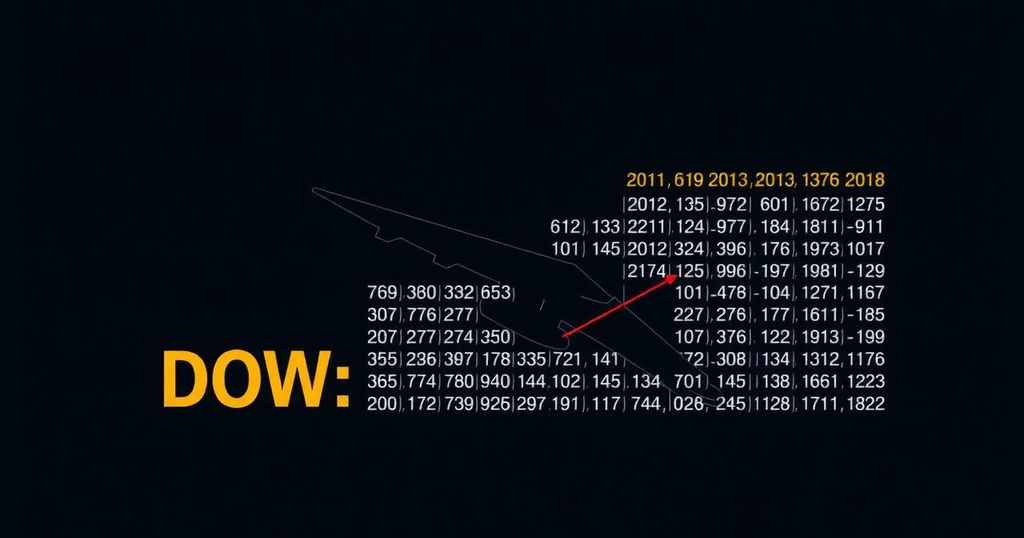Summary
The Dow Jones Industrial Average (DJIA) is intended to symbolize the thirty companies that serve as fundamental pillars of the United States economy. These firms are supposed to exemplify exceptional performance in contrast to their peers listed on the New York Stock Exchange and Nasdaq. However, Boeing (BA) has not epitomized this standard for the majority of the past five years, raising legitimate concerns regarding its continued inclusion in this esteemed index. The clear consensus among financial analysts and experts is that Boeing should be removed from the DJIA. Ron Epstein, an aerospace analyst at Bank of America, articulates a crucial point: “If you seek benchmark, financially stable corporations, Boeing does not meet those criteria any longer. I do not believe it should remain in the Dow.” The very term “industrial,” which is a component of the Dow’s full designation, is somewhat outdated, harking back to the index’s inception during the late 19th century, at the height of the industrial revolution in America. Over the last 126 years, the composition of the DJIA has evolved significantly to reflect the transformation from a predominantly industrial economy towards a landscape dominated by technology, services, and information. Historically, numerous key manufacturing sectors, such as automotive and steel, have been replaced in the index by firms from banking, technology, and pharmaceuticals, indicating that the absence of an aerospace manufacturer in the Dow would not be unexpected in today’s economic climate. The challenges faced by Boeing are significant and provide a rationale for questioning its persistent inclusion in the DJIA. Notably, the company has not reported an annual profit since 2018 and has incurred core operating losses totaling approximately $33.3 billion since then. The company’s operational inefficiencies have intensified as a result of safety concerns, with ongoing federal investigations prompted by a series of whistleblower reports highlighting a corporate culture that prioritizes profit over safety and quality. This has severely limited the production capabilities of its flagship 737 Max model. Furthermore, Boeing’s credit rating has plummeted, now teetering at the lower end of the investment-grade spectrum, with forecasts suggesting a forthcoming downgrade to junk bond status, which denotes a heightened risk of default. To complicate matters, Boeing has pled guilty to charges of misleading the Federal Aviation Administration concerning the 737 Max’s initial approval process, a deception that is linked to fatal design failures in two crashes. The company will soon operate under a court-appointed monitor, a development unprecedented for any company currently represented in the Dow. The drop in Boeing’s share price—over 60% since the second fatal crash of the 737 Max in 2019—coupled with a 35% decline following a recent incident further accentuates the need for reevaluation of its position in the index. The potential opportunity cost incurred by Boeing’s continued membership in the Dow is substantial; had share prices remained stable post the 2019 crash, the index might have been over 1,600 points higher. According to Sam Stovall, Chief Investment Strategist for CFRA Research, “If Boeing is not an albatross, it certainly acts as an anchor for the Dow.” Although Boeing became part of the DJIA 37 years ago, in 1987, historical context alone does not guarantee a company’s continued inclusion. General Electric, a foundational component of the Dow since 1908, was removed in 2018 following prolonged struggles. Stovall emphasizes the necessity for the Dow to remain relevant, suggesting other aerospace companies that presently boast profitability and larger market capitalization, such as Lockheed Martin and the aerospace division of General Electric, as more suitable candidates. Notably, in 2020, the Dow stripped ExxonMobil from its ranks, favoring a more technologically oriented company, Salesforce. While Boeing is unlikely to vanish as a corporation, its position in the Dow may soon be reconsidered in favor of more prosperous and relevant competitors, potentially including firms such as Tesla. Despite its predicaments, Boeing remains a crucial player in the U.S. economy, holding the title of the largest exporter and employing nearly 150,000 Americans, with an estimated economic impact of $79 billion. Nevertheless, the critical question rests not on Boeing’s survival, which is expected, but on its appropriateness as one of the thirty stalwarts that constitute one of America’s most scrutinized stock indices, often viewed as a barometer of the overall economic health.
Original Source: www.cnn.com

Leave a Reply